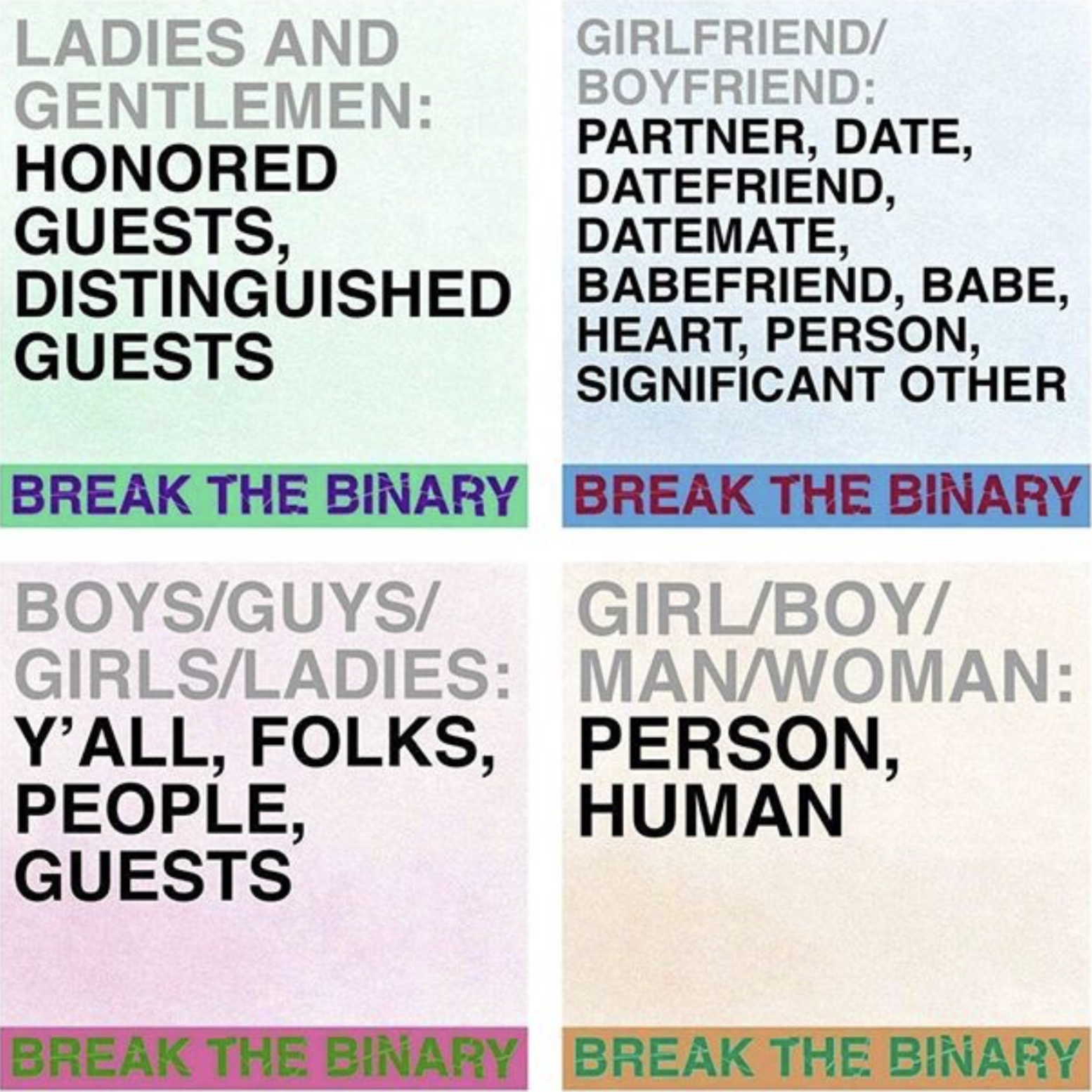A Person Walks into a Store…
A customer walks into your business and your customer service associate offers a warm, "Good afternoon! How can I help you, sir?"
The customer speaks, "I'm here to...." but, in that moment, the associate realizes that the guest is transgender and quickly responds, "I mean, ma'am. I'm sorry! I didn't mean any offense. I'm new here and not used to..." and perhaps goes on and on.
Awkward. For everyone.
The guest may feel like an alien, further embarrassed by the associate's over-apology. The associate may feel like a fool and fear for their job. No one wins and the guest may be reluctant to return to that establishment.
Face it, this is going to happen -- but it doesn't have to be so damn awkward. The associate should take a simple approach and apologize quickly and move on. Over-apologies drag out the drama when both parties would rather discuss something else. You are exposing your brand when your front line team isn't trained or aware of their own unconscious bias.
What is unconscious bias? Well, the associate certainly didn't intend to offend. Most people don't. But it happens because of the way our brains have been programmed by years of stimuli, in this case, placing others in boxes of either "male" or "female". An unconscious bias training will increase your employees awareness of these situations and give them tools to effectively communicate with their guests and team.
Non-Binary Designations Coming to State IDs
You may have seen the news that non-binary residents of California can now select X as their gender on state identification (instead of simply male or female). California is one of several areas which now allow a third gender designation. Similar laws are in effect in D.C. and Oregon.
D.C.'s law also permits individuals seeking to change their gender marker to make the change without certification from a medical provider or any other individual.
Last year, for the first time in the U.S., a judge in Oregon ruled that the state must recognize a third gender and applications for state identification have been updated to allow for the selection of X. This is notable in that the policy changed via a the court system, rather than the legislature.
Australia and New Zealand have allowed for third gender designations on passport applications since 2011 - so while this is new to a few U.S. states, these policies are changing elsewhere, too. Currently, Denmark, Germany, Malta, Canada, Pakistan. India, Ireland and Nepal also allow third gender options on passport applications.
While Gender X is the most popular third gender option, there are some which use "other" as an alternative.
With more and more people identifying as transgender and non-binary, it makes good business sense to consider a third gender on the forms used within your company. It sends a clear signal of inclusivity to guests and employees and can improve customer service.
Hey Guys
"Hey Guys!"
We've all heard it and most of us probably use it. And while "guys" generally doesn't literally mean "men", it's still important to consider language when greeting groups of people.
The greetings that follow are much more "gendered" than "guys" - and can be risky if one or more of the people in the group is transgender or gender nonconforming.
"Hey Girls!"
"What can I get for you ladies?"
"How are you doing tonight, gentlemen?"
Imagine a situation where a group approaches a host stand at a restaurant and the host opens with, "Good evening, ladies!" - yet one of the group is a trans man or non-binary. That guest will probably feel quite uncomfortable. In fact, one of our survey respondents shared, "As a trans man, I've been called "ma'am" or included in a greeting of 'ladies' when with my wife, and it makes me want to never return to that establishment. Using gender-neutral terms can be more comfortable for everybody."
What's a more successful approach?
The best approach is to keep language neutral. Here are some better greetings in that same scenario where a group approaches a host stand:
"Hi everybody!"
"What can I get for you folks?"
"How can I help you?"
Language matters, and offending guests - even accidentally - can be a costly mistake. Training employees to make a simple change to use non-gendered language can immediately create an atmosphere where everyone feels welcome - and minimize the risk to your brand.
Creative Ways to Designate Single Stall Restrooms for All Genders
There are several states in the country, and several cities, which now require all single stall restrooms to be labeled as all gender restrooms. This is the case in NYC, Denver, Philadelphia, the state of California and a few other places. These new laws are designed to ensure that transgender and non-binary people feel comfortable using the restroom (and as a positive side effect, will also cut down waits for women who often have longer lines).
When I travel around to conferences trainings and other events, I love taking photos of the "all gender" restroom signs I encounter, as well as the signs that direct guests to use the restroom where they are most comfortable. Some companies, like Starbucks and Target, established these of their own volition, while others do so in response to changes in public policies. It’s really fun for me to see how different companies are approaching this. Here are some of the signs we've spotted recently.
Which is your favorite? Have you made arrangements within your own company to create single stall all gender signs?
Why LGBTQ-Inclusive Corporate Policies Matter So Much
Mississippi has a new law which fully legalizes discrimination. Although this law is a bit redundant, since people who are LGBTQ already have zero protections in Mississippi, this "religious freedom" law is an example of the types of bills being written and laws being passed in other states as well. I’m sure you heard the controversy over North Carolina’s HB2 law requiring transgender guests to use the restroom based on the gender on their birth certificate. Although this law was repealed and replaced with a new, "improved" law HB12, the new law remains similarly discriminatory towards transgender people.
Folks who are transgender may or may not choose to transition. The process of transitioning from male to female or female to male is purely optional. It's also expensive, time consuming and there are many trans people who do not have the resources to medically transition. Some trans folks might identify as non-binary and have no intention of going on hormones or undergoing any other procedures for transition.
For these folks who are not planning to medically transition and legally update their gender marker, these discriminatory bills and laws may be particularly scary. Essentially, these laws require someone to use the restroom of the gender on their birth certificate, regardless of whether or not that is how they currently identify. With laws like this increasingly acceptable, it's important for companies to step up and provide protections for transgender employees and guests.
Does your company have an inclusive restroom policy? Has your company made arrangements to ensure that your transgender guests and associates can feel safe?









